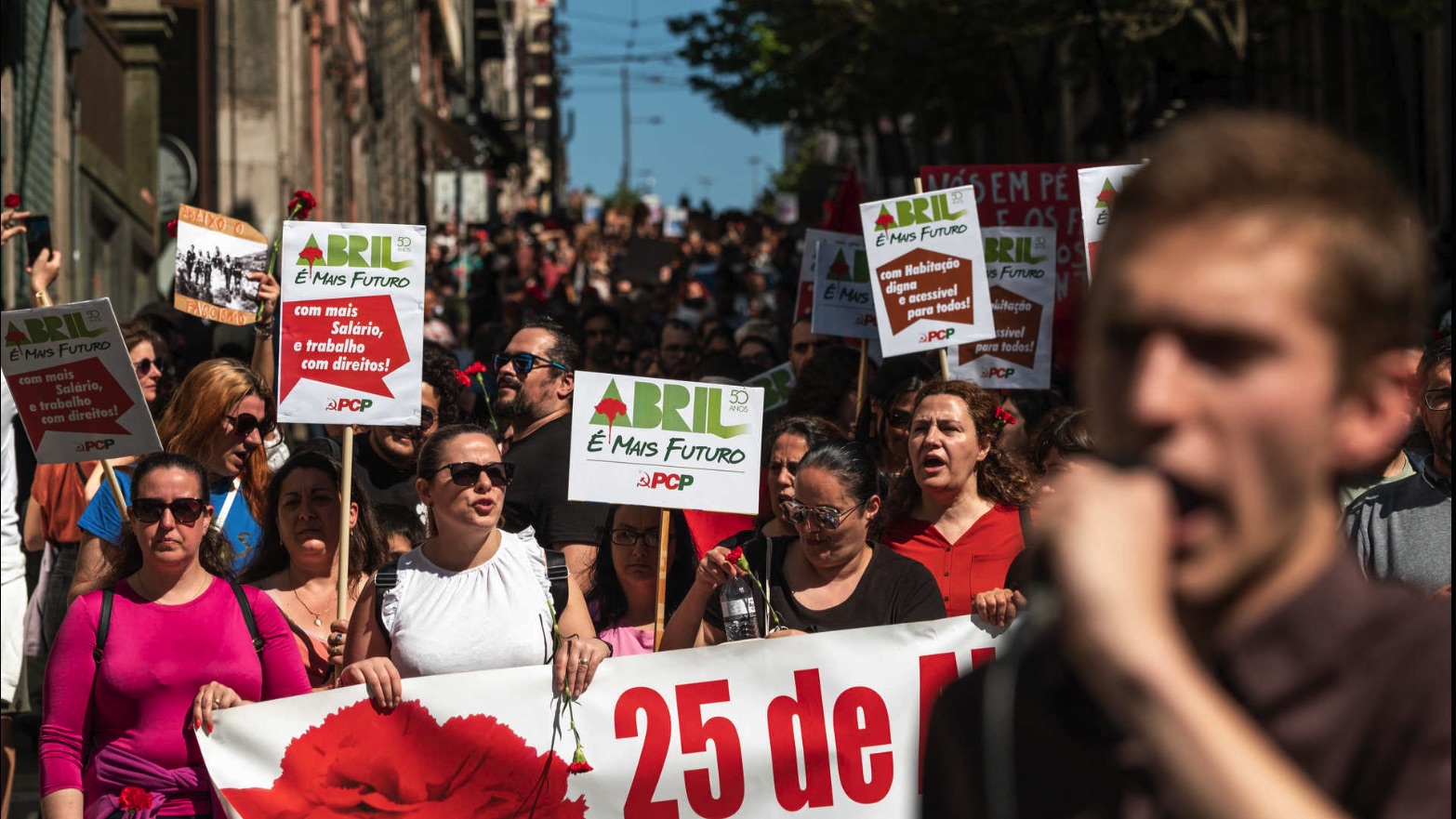
Published 25/04/2023 16:07 | Edited 4/25/2023 4:51 PM
As in other parts of the world, the Portuguese who celebrate the 49th anniversary of the Carnation Revolution, on this April 25, 2023, are fighting, more than ever, against lies. In the world of post-truth and fake news platforms, the revisionism that belittles the meaning of the April Revolution and softens the gravity of fascism is the most attacked theme in Portuguese progressive politics.
In front of the Portuguese Assembly, there were those who came to applaud Brazilian President Luis Inácio Lula da Silva, and the far-right members of Chega, who protested against his presence. But what spoke louder was the celebration of freedom day in Portugal, 49 years after the 25th of April.
“Enough of degrading institutions! Enough of putting shame on the name of Portugal ”, declared the president of the Assembly, Augusto Santos Silva, against the shouting of the deputies of Chega.
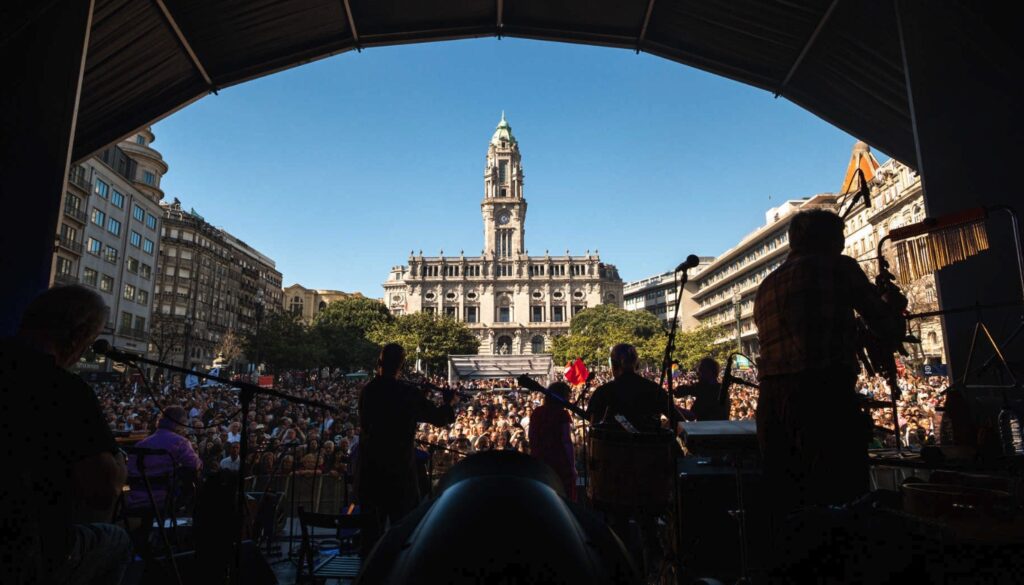
Chico Buarque
Composer and writer Chico Buarque also had his role in the week of April 25th. When he finally received, three years later, at the National Palace of Queluz, the Camões Prize for his literary works. A symbol of the pride that Portuguese people have in speaking the same language as Chico sings and talks about.
The author of Tanto Mar, with his verses celebrating the Revolution on the other side of the ocean, could not fail to address current threats. Taking advantage of the tour in Portugal, Chico is expected on the stages of 25 de Abril.
In his speech, on the eve of the anniversary of the end of the dictatorship in Portugal, Buarque thanked those present and said he felt reassured that the former Brazilian head of state, Jair Bolsonaro, had not “dirty” the diploma with his signature. And he also left a warning: “the fascist threat persists, in Brazil as well as everywhere else”.
The threat of war is voiced by Lula as a threat to all workers in the world. Despite the silence around the effort for peace, and the stimulus for the promotion of war, he could not fail to emphasize the pacifist character of the Carnation Revolution.
For the avoidance of doubt, Lula also noted that Brazil condemns the Russian invasion of Ukraine, but seeks to bring countries together in the name of convincing the parties to sit down at the negotiating table.
“I never equated the two countries because I know what an invasion is and what territorial integrity is. We all think that Russia made a mistake and we have already condemned this in all UN decisions, but I think that the war has already started and now it needs to stop. For that, there needs to be someone willing to talk,” she said.
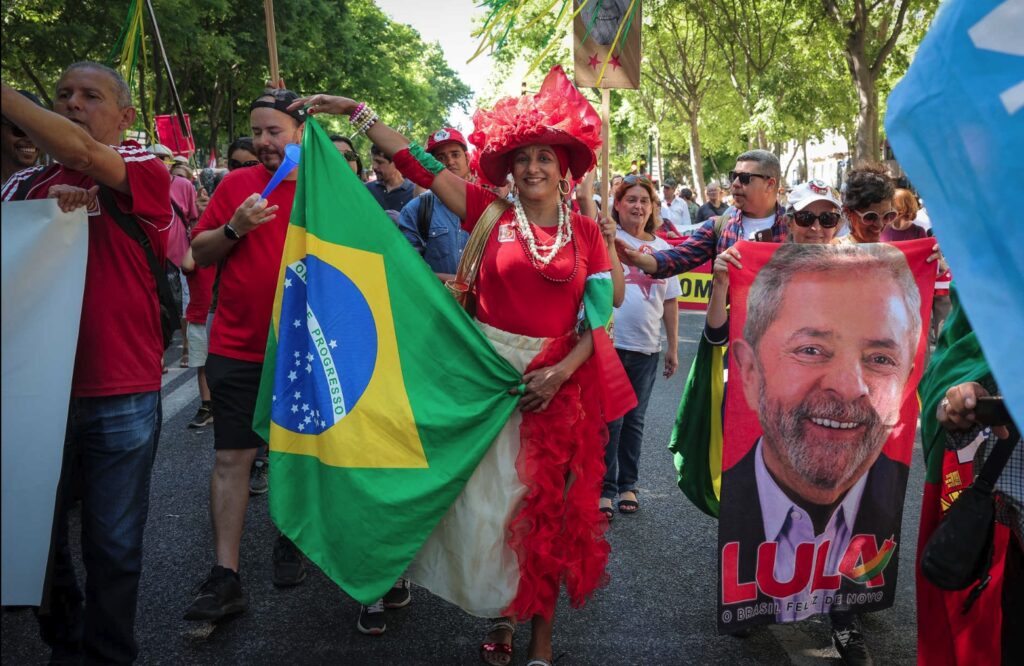
March for Freedom
The afternoon of Freedom Day began for many at the Marquês de Pombal roundabout, in Lisbon. “We are many, many thousand to continue April!”, you can hear all over the avenue. In Porto, in Largo Soares dos Reis (in front of the former headquarters of the political police of the dictatorship), the march also gathers thousands with slogans that resound all the way to Avenida dos Aliados. On both stages, Chico Buarque and the inevitable Tanto Mar are heard, as well as Fado Tropical.
The parade, which takes place every year to celebrate the values of April, has the participation of various civil society structures, such as the 25th of April Association, the Union of Portuguese Anti-Fascists (URAP), the Just Life Movement, the Democratic Movement of Women (MDM), the Movement for the Rights of the Palestinian People and for Peace in the Middle East (MPPM), as well as the trade union centrals – CGTP and UGT.
Chega, which always receives a lot of attention from the press, certainly did not participate. But several parties with parliamentary representation were present at the march: the Portuguese Communist Party, the Left Block, the PS, the BE, PAN and the Liberal Initiative (which rejoined the march after two years walking down Avenida in a separate parade).
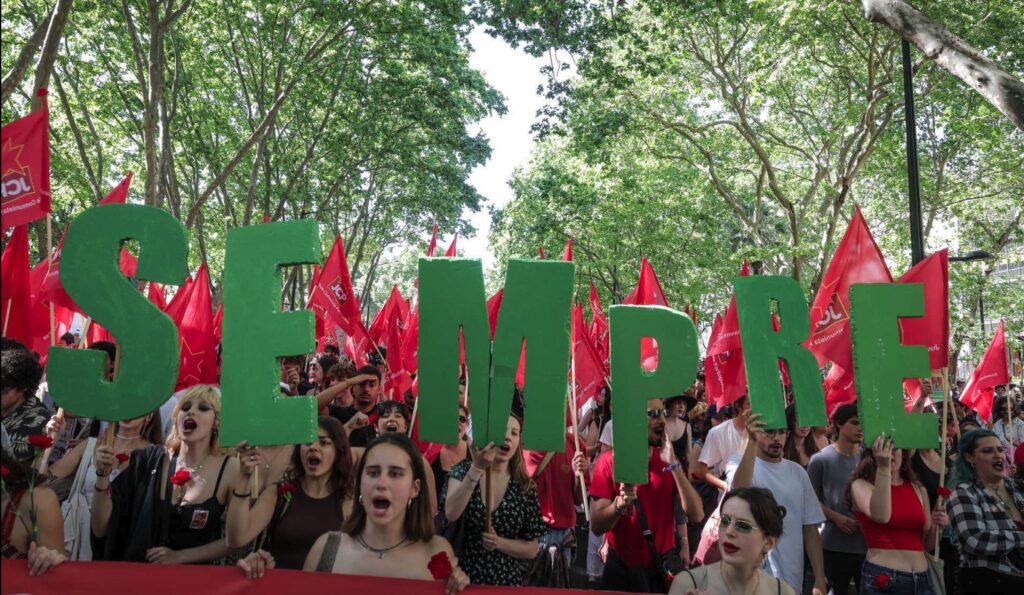
dispute for history
Portugal faces economic austerity at the expense of the suffering of the worker, under the allegation that there is no possible alternative. The same neoliberal rhetoric defeated on so many occasions by the popular struggle. This is reflected in the marches of the 25th of April.
In order to convince the people of the fallacy of the single thought of endless fiscal adjustments, they must forget the April dream. Therefore, the march and its speeches are always remembering the values of the Carnation Revolution.
In his speech at the commemorative lunch, Paulo Raimundo, secretary general of the Portuguese Communist Party (PCP), emphasized the celebration of the “liberating act that put an end to the long fascist night of 48 years of misery, illiteracy, prisons, torture, death, colonialism, war”.
He highlighted that it was this fascist regime of Salazarism, which was aligned with international fascism, joined hands with imperialism, “and it was by that hand that Portugal became a founding member of NATO”, he said, in criticism of the war in Ukraine.
“Today, like yesterday, it is essential to know and make known what fascism was, at a time when there is no shortage of people trying to erase, adulterate or sweeten it, rewriting history with the greatest shamelessness and without any shame”, he emphasized.
For him, the 25th of April is not one of those who attacked and attack it, who committed and continue to commit so that the Revolution does not take place. “April is not one of those who clean up the image of fascism,” he said.
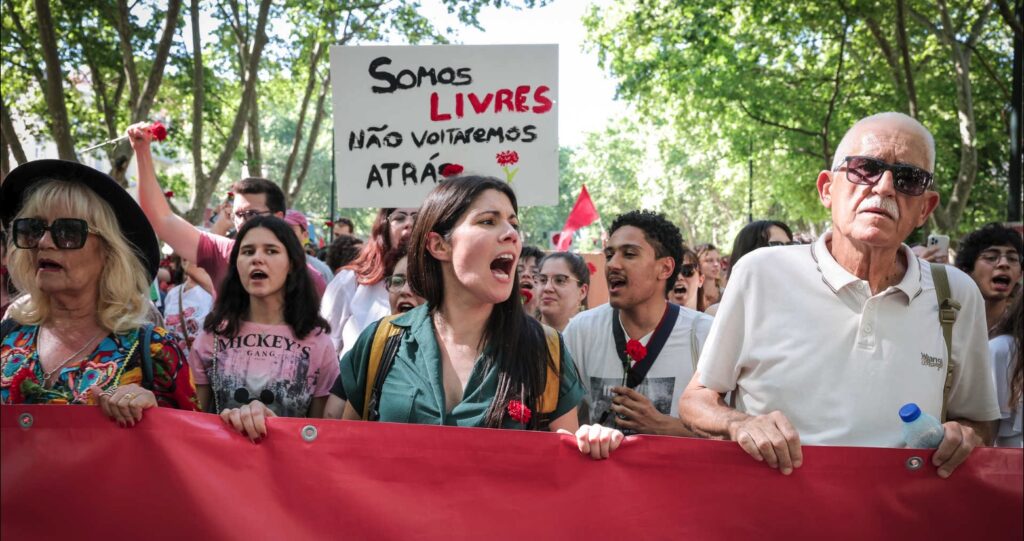
He recalled that the April celebrations are often attacked by the right, who “don’t get tired of trying to condition”. “This year is no exception. Because it only makes what was already evident even clearer: that they mishandle democracy, mishandle a sovereign country with its own voice, mishandle those who defend the cause of peace, and yes, mishandle April 25th. ”, he declared, emphasizing this as the central issue.
He pointed out the enormous advances of the revolution for the Portuguese people, as well as the setbacks of the counterrevolution. “The 25th of April belongs to its builders and such is its strength and the validity of its project, the depth of its conquests, which decades of counter-revolution and right-wing politics have not yet been able to, nor will they be able to destroy”, stressed.
At the present time, Paulo criticized the Government for trying to revise the 1976 Constitution, instead of complying with it. He also criticized setbacks such as privatization, support for the war, the precariousness of public services, low wages, real estate speculation, food inflation, and the stability program (fiscal adjustment). But he also recalled how popular pressure on the government was able to deny the austerity argument and guarantee an increase in pensions and wages.
Yesterday, in the Assembly of the Republic, the deputy of the PCP, Manuel Loff also reaffirmed the relevance of the Portuguese Revolution. For him, it is not simply made of memory. “Quite the contrary: when we always say April 25th! we are saying that we will not renounce every day what was achieved in April – rights, freedoms and civic guarantees that we will never accept to see restricted again. The right to publicly defend our rights as citizens and workers, to demonstrate freely to do so. The right to defend peace against war, today as 50 years ago. The right to say, today as then, Fascism never again!”
According to the communist deputy, democracy is again threatened by fascism, “from whose shadow we thought we had freed ourselves all over the world 80 years ago, or, precisely, 49 years ago in Portugal”.
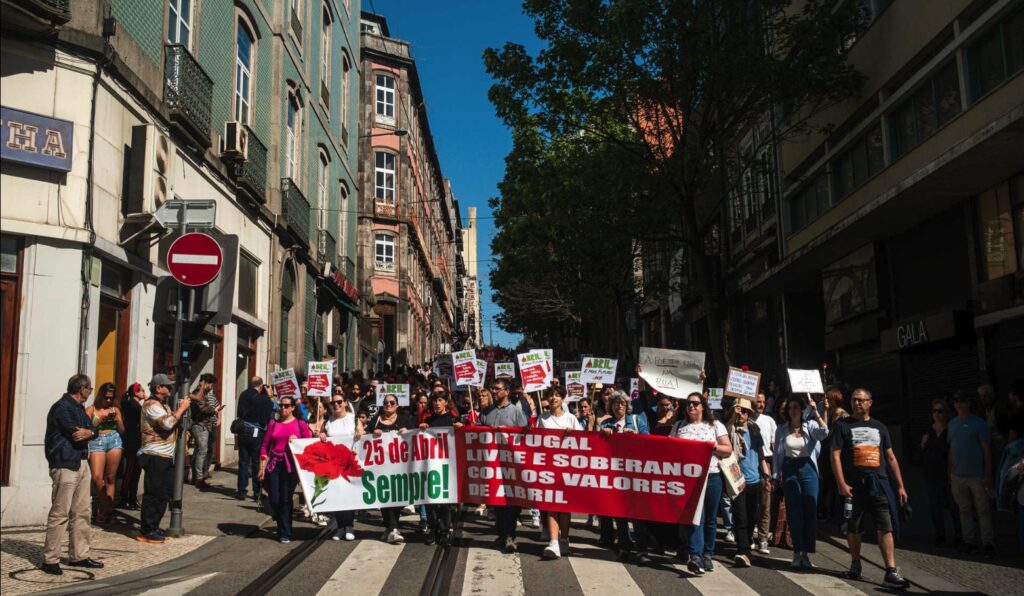
“It is illusory to believe that the assault on power by the fascist extreme right leaves democracy unharmed. The example of the struggle that Brazilian democrats had to fight, thanks to the extraordinary human persistence of President Lula da Silva who was here this morning, to defeat what was the greatest threat, absolutely real, against Brazilian democracy since the end of the dictatorship civil-military, speaks well of the dangers that the extreme right represents”, he concluded.
In the European Parliament, the communist deputy Sandra Pereira also highlighted the anti-fascist character of the April Revolution. Well, it was at dawn on April 25, 1974, “that the long fascist night that oppressed Portugal and the Portuguese people for 48 years came to an end”.
“A criminal dictatorship that repressed, censored, arrested, tortured and murdered many of those who dared to oppose it, particularly communists,” he said.
She also reaffirmed the cries of struggle that march through the streets of Portugal. “Equality, freedom, democracy, these are not empty words: they are the present and the future to fulfill and defend. April 25 always, fascism never again!”
Despite the reasons for contestation, evident in the banners that spread along the avenues of Portuguese metropolises, there is a festive atmosphere in the parades. Many are those who took to the streets with family and friends, with carnations in their hands or on their chests, to celebrate freedom. Some hold up signs where you can read messages such as “Long live popular power”, “Never again fascism” and “Less hatred, much more fraternity”.

Source: vermelho.org.br

